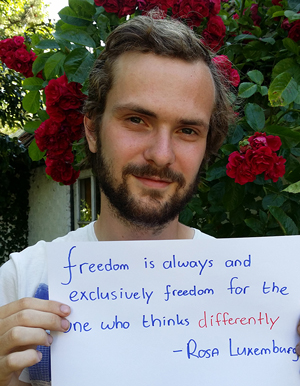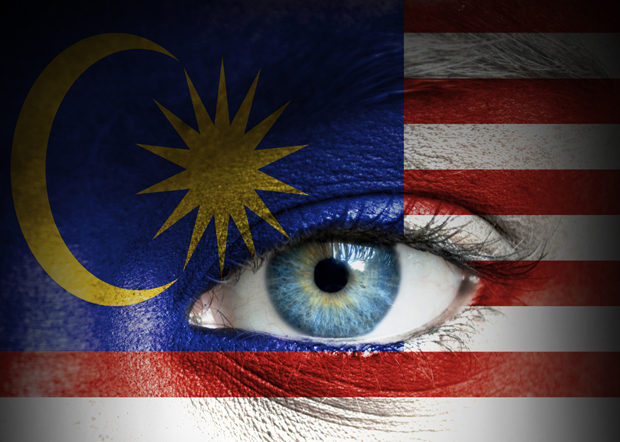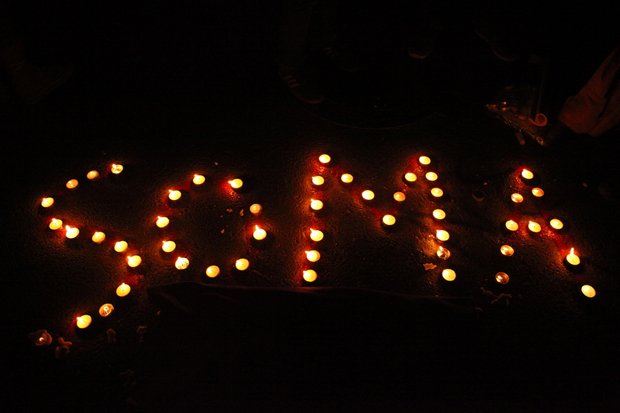19 Aug 2015 | mobile, Netherlands, News, Youth Board
This is the sixth of a series of posts written by members of Index on Censorship’s youth advisory board.
Members of the board were asked to write a blog discussing one free speech issue in their country. The resulting posts exhibit a range of challenges to freedom of expression globally, from UK crackdowns on speakers in universities, to Indian criminal defamation law, to the South African Film Board’s newly published guidelines.

Ravian Ruys is a member of the Index youth advisory board. Learn more
“Haat imam” is a man whose life solely depends on the complete destruction of western values and interests, or so one would think if you were reading or watching the Dutch media.
It is a word used whenever we are talking of an imam whose views are considered either too conservative or too radical. In most cases, when someone is labelled a haat imam, they are subject to protest or no-platforming. In 2015, there have been three known cases of events being cancelled because some of the speakers were labelled haat imams. In these incidences, the individuals involved were investigated by Dutch security services and considered safe, meaning they were found to have no known links to terrorist organisations.
All this has led the Volkspartij voor Vrijheid en Democratie (People’s Party for Freedom and Democracy), a political party currently in power, to advocate a blacklist for radical preachers. The party warns that this blacklist should not only include those Muslim preachers who have known links to terrorist organisations, but also those who spread hate.
This means public pressure leads to the narrowing of freedom of speech for one specific group of people. It has also created a feeling of persecution surrounding young Muslims, made even worse by the deputy prime minister quoting flawed scientific research stating that 80 per cent of young Dutch-Turks support ISIS.
If you are a Muslim in the Netherlands, you are now in an environment where you feel you must be the nicest Muslim anyone has ever met or you can’t be trusted. Perversely, this lack of trust is often quoted as one of the things that drives young Muslim men and women into the arms of extremist organisations. Consequently, a policy trying to protect us against extremist propaganda works in favour of the extremists.
The Netherlands has a great reputation when it comes to freedom of speech and we should keep it that way. This means creating a fair and equal space for Muslims in our country to debate their religion on their terms. We might not always like what we hear, but we cannot intervene directly unless a direct threat is made against innocents. If we do not trust those involved, in other words, if we do not trust our fellow countrymen, how can we expect their trust in return?
Without trust, politics and civil society become a bloody mess.
Ravian Ruys, The Netherlands
Related:
• Muira McCammon: GiTMO’s linguistic isolation
• Jade Jackman: An act against knowledge and thought
• Harsh Ghildiyal: Defamation is not a crime
• Tom Carter: No-platforming Nigel
• Matthew Brown: Spying on NGOs a step too far
• About the Index on Censorship youth advisory board
• Facebook discussion: no-platforming of speakers at universities
10 Apr 2015 | Events, mobile

Index on Censorship magazine are holding a big debate, in partnership with the Leeds Big Bookend festival.
Does freedom of religion and freedom of speech come as a package or can you pick and choose? Do those people who suggest freedom of expression should be “civilised” and that we should be wary of causing offence to people’s religious sensibilities have a point? Or is the world full of offended people and any idea of holding back ends up with us not being able to talk about important issues?
Panellists: Anthony Clavane, playwright, journalist and author of Promised Land and Sunday Mirror sports journalist: A Northern Love Story; Chris Bond, journalist with the Yorkshire Post; Chief Imam Qari Muhammad Asim MBE of Leeds Makkah Masjid; Rachael Jolley, editor of the Index on Censorship magazine
WHEN: Wednesday 10th June 2015, 6.30pm
WHERE: Waterstones, Albion Street, Leeds
TICKETS: £3 / available here
19 Aug 2014 | Malaysia, News, Religion and Culture

(Image: Aleksandar Mijatovic/Shutterstock)
It is said that the Muslim jurist al-Shafi’i so revered the name Allah that he wore a ring inscribed with a message to himself from God. One might think, then, that the name would be universally celebrated in those countries where the doctrine of al-Shafi’i is the predominant school of Islamic jurisprudence. But this is not the case in Malaysia. In June, the federal court turned down an appeal by a Catholic bishop against a decision of the ministry of home affairs to impose limits on certain uses of the word Allah.
The story dates back to 2009, and a letter from Che Din bin Yusoh, a civil servant working for the ministry, to the Roman Catholic Archbishop of Kuala Lumpur, Murphy Nicholas Xavier Pakiam. It approved a permit to publish The Herald, a weekly Catholic newspaper available in English, Chinese, Tamil and Bahasa Melayu, the official language of Malaysia. On the face of it, the letter contained good news: renewed permission to publish The Herald, in print since 1994. But it also stipulated two conditions: that Pakiam and the Bishops of Peninsular Malaysia confine their distribution of The Herald to the church and its adherents; and that they refrain from printing the word Allah in the Bahasa Melayu version.
The first condition was inconsequential as far as the bishops were concerned: The Herald had only ever been distributed amongst the congregants of the country’s three archdioceses. Furthermore, since the 1970s and 80s, the church had adopted a largely ecumenical posture towards the other religious establishments in Muslim-majority Malaysia, partly in response to the rise of the Islamic dakwah, or missionary, movement. (Proselytising Muslims is also an offence under Malaysian Federal law.)
The second condition, however, was intolerable to the bishops. Allah, from Arabic, is the Bahasa word for God irrespective of the religious context in which it is used — just as it is for Bahasa-speaking Sikhs, Indonesian and Arabic-speaking Christians, Mizrahi Jews, Maltese Catholics, and many other non-Muslim groups — and it appears in Al-Kitab, the Bahasa translation of the Bible. The second condition effectively forbade the use of the word Allah in the Bahasa version of The Herald in reference to any God but the Islamic deity.
And so Pakiam went to court, seeking judicial review of the government’s decision to impose the second condition. He asked for an order of certiorari, quashing the decision. He also asked for a series of judicial declarations: that imposing such a condition violated certain fundamental freedoms enshrined in the constitution — the rights to freedom of speech and to practice non-Islamic religions in peace and harmony — and, in a bold move that invited the Malaysian judiciary to pronounce dispositively on a matter of considerable religious sensitivity, that the word Allah is not exclusive to the Islamic faith. The bishops also asked the Court to find that the decision was irrational and unreasonable, contravened the laws of natural justice, and had been made in bad faith.
The ministry’s decision to impose the Allah condition can only be understood in the light of a series of laws passed by ten of Malaysia’s thirteen state legislatures. These enactments — each called some variation on the Control and Restriction of the Propagation of Non-Islamic Religions — proscribe the use of any of 25 words or 10 phrases in reference to a religion other than Islam. (The Johor state enactment doesn’t include a list of words or phrases but imposes a blanket ban on the use of words of “Islamic origin”.) The list of words could double as a glossary of key terms for any student of Islamic theology: Allah, Fatwa, Hadith, etc.; and the list of phrases contains such Islamic maxims as Alhamdulilah and Allahu Akbar. The laws vary in their severity — what might in Terengganu lead to a fine of 1000 ringgits could in Kelantan result in a five-year jail term and/or whipping — but so sacrosanct are they in the eyes of many that five states, as well as the prefecture of Kuala Lumpur and the Chinese Muslim Association of Malaysia, attempted (unsuccessfully) to join the government as defendants in Pakiam’s action.
But on the final day of 2009, the high court found in favour of Pakiam and the Bishops of Peninsular Malaysia, marking either a victory for freedom of speech or a lamentable triumph of secular values over democratic choice in a majority Muslim country, depending on one’s view. The issue, however, was far from resolved. For one thing, the government appealed against the decision of the high court, as did the five states. For another, the high court had not been asked to review the legality of the various non-Islamic religions enactments — merely the decision to impose the condition contained in bin Yusoh’s letter — and so, they remained good law.
This would prove troublesome for Malaysia’s Christians. In early 2011, it was reported that the Islamic affairs departments of certain states had raided the premises of various Christian organisations, including a Bible-import business called Gideon, and impounded tens of thousands of Bahasa and Iban-language Bibles, citing the Non-Islamic religions enactments as justification. This prompted the prime minister of Malaysia, Mohammad Najib Abdul Razak, to write to the chairman of the Christian Federation of the country, proposing a ten-point solution to defuse the welling inter-religious tension. The letter affirmed that Bibles in any language could be imported into the country, but stipulated that Bahasa-language Bibles, whether imported or locally-produced, must have a crucifix and the words Christian publication printed on their front.
The inclusion of this proviso made clear the strength of the government’s fear of non-Islamic and secular proselytising encouraged by the ready availability of Bahasa-language Bibles — fear of the “naked public square”, increasingly devoid of Islamic speech and thus increasingly hostile towards Islam in general, to paraphrase the American Catholic writer John Neuhaus. Given this anxiety on the part of the Government one might think that all the parties would have embraced the ten-point proposal as a much-needed compromise. But for various reasons — the peculiarities of Malaysian domestic politics and the procedural limitations of the justice system, to name two — the proposal was never enshrined in law and the various state enactments remained untouched. Preserving the status quo, however, meant that incidents of Bible-seizing continued; the most recent widely reported case occurred earlier this year, in Selangor province.
And then, as if to rub salt in the Bible-seizing wound, the court of appeal ruled unanimously in favour of the ministry and set aside the decision of the high court. The bishops were given leave to appeal but, on 23 June of this year, the Federal Court of Malaysia turned down their application and upheld the decision of the court of appeal, thus drawing the case to an unsatisfactory close.
The decision of the federal court — decided by a narrow four-to-three margin — is disappointing not only in the result but in the reasons given, too. Like many administrative law cases, the judgment is preoccupied with questions of procedural, rather than substantive, unfairness. This would be tolerable if the decision taken by the ministry had not impacted on fundamental rights enshrined in the federal constitution: Article 3 asserts that while Islam is the official religion of the federation, this should not impinge on the rights of non-Muslims to practice other religions in peace and harmony.
But, in banning the use of the world Allah in a weekly newspaper, the decision clearly affected the rights of individuals to freedom of speech and religion. The questions put before the court were held by the three dissenting judges to be of such constitutional importance that all three chose to write opinions setting out their reasons, an incredibly rare occurrence in judicial review proceedings of this kind: “too weighty to suffer indifference,” wrote Justice Zainun Ali.
The majority opinion of Justice Arifin Zakaria, by comparison, is preoccupied by the far more incidental question of whether the appropriate standard in evaluating the reasonableness of a decision taken by the ministry should be objective or subjective. And Justice Zakaria also concludes that the decision of the Court of Appeal must be correct because Pakiam had not sought to challenge the various state enactments before the high court. As the enactments were not the object of judicial review, Zakaria can only conclude that the decision to impose a condition on the propagation of non-Islamic religion was in keeping with the letter and spirit of those laws and not, therefore, an abuse of power. If put forward in a contextual void this argument might be persuasive. However, Zakaria also upholds the decision of the court of appeal on the basis that Pakiam would have erred if he had sought to challenge the various state laws before the high court, as the only appropriate forum in which to bring such a challenge would have been the federal court. Pakiam and the bishops were predestined to lose, it would seem.
If there were a southeast Asian regional court of human rights, we might think that the Bishops of Peninsular Malaysia would have good grounds to get on its cause list. Presuming the existence of some regional charter of fundamental rights, similar in content, say, to the European and American Conventions on Human Rights, the bishops would surely be able to rely either on a breach of the fundamental rights or on the denial of an effective remedy at law. And given the relative willingness of supra-national courts to scrutinise governmental arguments premised on public order and/or national security with greater force, we might even imagine such a regional court to declare the various non-Islamic religions enactments in breach of such a charter.
Then again, such a court might equally take into consideration the fact of Malaysia’s Muslim-majority population and conclude that the government had acted to protect the religious rights of the majority from the tyranny of a minority. In the now-famous European case of Lautsi v. Italy, the European Court of Human Rights held that the display of crucifixes in Italian state schools was not in breach of Article 9 ECHR (the right to freedom of conscience and/or religion). But whereas in Lautsi it was held that the “negative” right to freedom of religion did not endow individuals with the right to be always and ever free from encountering religious imagery, in Malaysia the various state laws actively impinge on the exercise of a minority religion. The result of Titular Roman Catholic Archbishop of Kuala Lumpur vs. The Government of Malaysia has led many to conclude that questions of religious coexistence and the true ownership of the word Allah cannot be resolved through the courts. That is undoubtedly true. But in the meantime, if Archbishop Pakiam and the Bishops of Peninsular Malaysia feel that they have been the victims of a miscarriage of justice, then that would be true, too.
This article was posted on August 19, 2014 at indexoncensorship.org
16 May 2014 | News, Turkey

Protesters hold a vigil in Istanbul. (Photo: Nurcan Volkan / Demotix)
On the 13th of May the Soma mining disaster caused by carbon monoxide poisoning left over 230 dead. Writing this from afar, sadly there is an excessive amount of police brutality being applied to the protesters who were simply expressing their sadness and fury.
There were arrests. The most painful of all was that there were relatives of the deceased among the people who were detained. This time it wasn’t the freedom of speech that was taken away. It was the freedom to mourn.
While dreaming of awaking each morning to sunlight, there were those who awakened to a coal black. Those, who sacrificed saluting the day with sunlight and nurtured their hopes in a coal black to bring home food and to prepare a future for their children… didn’t, couldn’t… their hopes buried in coal black…
One can struggle for anything, anywhere, in any condition. As long as one breathes… but what if coal black stopped one from breathing? Children left behind without a father, women left behind without a husband, sisters left behind without a brother, mothers and fathers left behind without a son…
the sound of pain has never been filled with this much fury, fury has never turned so bitter… death has never come this blatantly…
The reasoning that easily ignores safety for the sake of more production at a lower cost per ton, causes murders. The disaster in Soma is not an accident. For the sake of mining coal for a thermal plant to produce electricity, our workers have been buried in pitch darkness so that we may be illuminated.
When lust for power and potency takes place of conscience…
When power is built upon fear…
Those, who are out of breath because of coal black, are of no worth
Those, who die at a very young age, are of no worth
Child labor, is of no worth
Freedom of speech is of no worth
Freedom of expression, is of no worth
Trying to express your feelings is of no worth
Trying to put your fury into words is of no worth
The humanitarian values are of no worth
What is of worth is, justifying those, who says “these are usual things”
What is of worth is silencing those, who show resistance
What is of worth is shutting up those, who object
What is of worth is controlling the media
What is of worth is ignoring the facts
What is of worth censoring
What is of worth is banning
What is of worth beating up
What is of worth is submissiveness
What is of worth becomes obedience
Without questioning, at the cost of lives
Brutality of those who are lacking pain empathy…
The hatred and brutality of mercilessness…
And amidst all these, the sensibility of an injured miner, with his coal black face asking in the ambulance “shall I take my boots off? Don’t want to dirty the stretcher.”
And painfully realising that this mercilessness has even taken away your words…
This article was posted on May 16, 2014 at indexoncensorship.org




